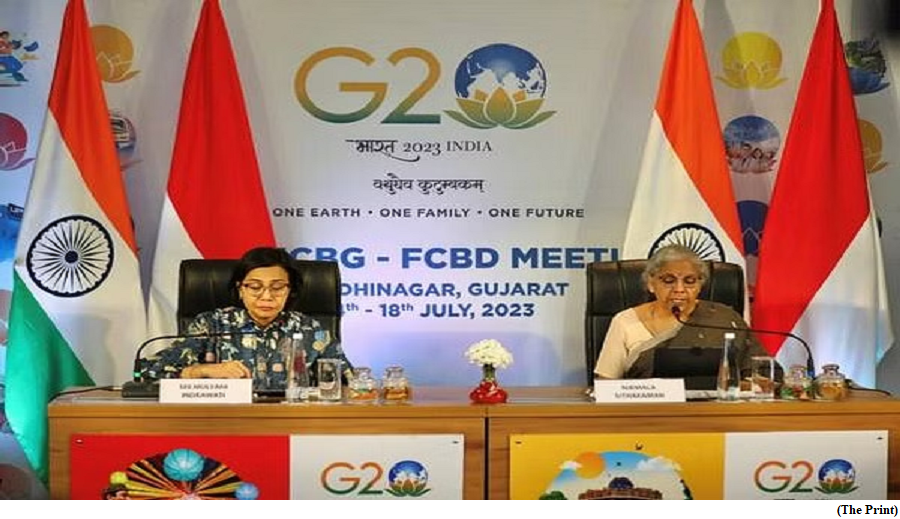India and Indonesia announce launch of the “India – Indonesia Economic and Financial Dialogue” (EFD Dialogue) (GS Paper 3, Economy)

Why in news?
- Recently, Indonesia and India announced the launch of the “India – Indonesia Economic and Financial Dialogue”.
- The platform, unveiled during the G20 Finance Ministers and Central Bank Governors (FMCBG) meeting, seeks to strengthen cooperation between the two nations and foster a shared understanding on global issues.
Bilateral relations:
- The evolution of India's ‘Look East Policy’ in 1991, followed by the ‘Act East Policy’, has facilitated a rapid development in our bilateral relations, particularly in the commercial and cultural fields.
- Indonesia has emerged as India’s largest trading partner in the ASEAN region, with our trade seeing an eightfold increase since 2005, reaching an impressive $38 billion in FY 2022-23.
Key Highlights:
- The EFD Dialogue is poised to enhance collaboration on bilateral and international economic and financial matters by bringing together economic policymakers and financial regulators from both countries.
- Areas of cooperation inter-alia, include macroeconomic challenges and global economic prospects, bilateral investment relations, and cooperation in G20 and ASEAN matters.
- Recognising the potential of the digital economy, the two Finance Ministers also noted the potential of collaboration in the field of fintech for financial inclusion.
Way Forward:
- Given the similarities between India and Indonesia as fast-growing economies, and their active roles in multilateral organisations such as G-20, WTO, and East Asia Summit, this Dialogue promises to offer a unique opportunity for mutual learning and policy coordination.
Lightning not a natural disaster, says Centre
(GS Paper 2, Judiciary)
Why in news?
- The Union government is not in favour of declaring lightning a natural disaster as deaths caused by it can be prevented by making people aware of safety steps.
- India is among only five countries in the world that has an early warning system for lightning; the forecast is available from five days to up to three hours.

Demand for including lightning as a natural disaster:
- The States such as Bihar and West Bengal have been demanding that lightning deaths be covered as a natural disaster. Once this is notified, the victims will be entitled to compensation from the State Disaster Response Fund (SDRF). The Centre makes 75% of the contribution to the SDRF.
- Cyclone, drought, earthquake, fire, flood, tsunami, hailstorm, landslip, avalanche, cloudburst, pest attack, frost and cold wave are now considered disasters under the SDRF.
Vulnerability in Bihar:
- Bihar is one of the most vulnerable States and as many as 107 had died after being struck by lightning till July 6.
- In the past few years, there has been a spurt in deaths due to lightning. It is possible that climate change is one of the reasons. In the past five years, more than 1,500 people have lost their lives in Bihar.
- The timely alerts were sent out to people and pamphlets were distributed at the panchayat level to make people aware of the dangers associated with lightning.
States with highest frequency of lightning:
- National Crime Records Bureau (NCRB) data show that 2,880 people died in lightning strikes in 2021. The deaths made up 40% of all accidental deaths caused by “forces of nature”.
- As per India Meteorological Department (IMD), the frequency of lightning was the highest in northeastern States and in West Bengal, Sikkim, Jharkhand, Odisha and Bihar, but the number of deaths is higher in the central Indian States of Madhya Pradesh, Maharashtra, Chhattisgarh and Odisha.
UK signs CPTPP, the ‘biggest trade deal’ since Brexit
(GS Paper 3, Economy)
Why in news?
- The United Kingdom formally signed a treaty to join the Comprehensive and Progressive Agreement for Trans-Pacific Partnership (CPTPP) in Auckland, New Zealand.
- It was the biggest trade deal since the UK left the European Union at the beginning of 2020.
- The pact would boost UK exports by 1.7 billion pounds (€1.9 billion, $2.23 billion), imports to the UK by 1.6 billion pounds and gross domestic product (GDP) by £1.8 billion pounds in the long term. The pact is expected to take effect in the second half of 2024.

What is CPTPP?
- The CPTPP is a landmark pact agreed upon in 2018 that cuts trade barriers among 11 countries, including Australia, Brunei, Canada, Chile, Japan, Malaysia, Mexico, New Zealand, Peru, Singapore and Vietnam.
- The pact requires countries to eliminate or significantly reduce tariffs and make strong commitments to opening services and investment markets.
- It also has rules addressing competition, intellectual property rights and protections for foreign companies. CPTPP is seen as a bulwark against China’s dominance in the region, although China has applied to join, along with Taiwan, Ukraine, Costa Rica, Uruguay and Ecuador.
- Politicians in several countries, including the UK and Australia, are lobbying to keep China out, while Beijing is trying to prevent Taiwan from joining.
Why is the CPTTP so important to the UK?
- The CPTTP will cut tariffs for UK exports to Asia Pacific countries and with UK membership, the trading bloc will have a combined GDP of 12 trillion pounds and account for 15% of global trade.
- Britain is keen to deepen trade ties in the Pacific after Brexit in 2020.
- It has been pushing a “Global Britain” strategy since it gave up EU membership after nearly 50 years, leaving the bloc’s single market and customs union.
Economy post Brexit:
- Critics say CPTTP and other deals will struggle to compensate for the economic damage sustained by leaving the now-27-member EU.
- The UK’s long-term productivity is forecast to be reduced by 4% as a result of Brexit.
- The UK already has trade deals with 10 of the 11 other CPTPP members and the eventual economic boost is likely to increase GDP by just 0.08% annually.
- In 2022, Britain exported 340 billion pounds of goods and services to the EU, 42% of total UK exports.




